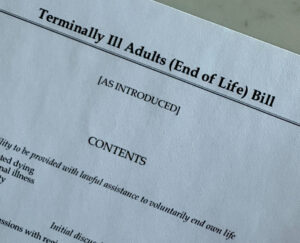 What’s this about?
What’s this about?
On 2 May 2025, the Government published four key documents relating to the Terminally Ill Adults (End of Life) Bill: an Impact Assessment, an Equality Impact Assessment, a Human Rights Memorandum, and a Delegated Powers Memorandum. These reports assess how the Bill would work in practice and conclude it is ethically justified, financially viable, and safely designed.
Here’s everything you need to know about these assessments.
What do the Impact Assessments focus on?
The extensive impact assessments focus a lot on analysis of the financial implications of the Bill. However, the Government recognises that doesn’t truly reflect the impacts the Bill will have, saying: ‘adding only the quantified elements of [the impact assessment] together would not give a comprehensive assessment on the net impact of the Bill because significant unquantified impacts would not be accounted for in that net figure’.
In other words, it does not take into account the human costs of doing nothing. We have produced a separate report on this, which highlights that:
- Thousands of terminally ill adults would continue to suffer every year if the Bill is not passed, with many forced to take their own lives, even with the best possible standard of palliative care
- Legalising assisted dying is linked to an increase in the provision of palliative care, alongside bringing peace of mind to individuals who choose to avail of an assisted death
- The current situation exports compassion abroad, creating inequalities based on wealth, resources, and family support
- A broken system subjects families to harsh, intrusive investigations for acts of compassion, which are very rarely prosecutable.
Safeguards and Protections
The Bill includes strong protections to ensure people are eligible, informed, and choosing freely.
Key features:
- Two independent doctors must agree the applicant qualifies.
- A panel (doctor, psychiatrist, social worker) reviews each case.
- Mandatory reflection periods to allow reconsideration.
- Disability Advisory Board and advocates involved.
- Mandatory training on recognising coercion, and supporting disabled and autistic people.
As the Impact Assessment confirms:
‘The Bill goes further than some other jurisdictions in terms of oversight, regulation, protections and safeguards.’
Professional Autonomy
The Impact Assessment confirms again that healthcare professionals can opt out if they object – no one is forced to participate.
Fair Access for All
The assessments recognise concerns about how the Bill might impact disabled people. To address this, the Bill includes specific safeguards to protect against pressure or coercion and to ensure decisions are truly voluntary.
These measures are designed to protect, not exclude, disabled people;ensuring safety, autonomy, and equal dignity for all who are eligible.
The Government’s analysis also confirms that the new law will also offer compassion to people who cannot afford to travel abroad for assisted dying.
Financial Considerations
Although the Bill is driven by compassion, not cost-saving, the Government’s assessments show it is also affordable:
- Healthcare savings: Less end-of-life care for people who choose an assisted death could save the NHS up to £59.6m per year by year 10.
- Implementation costs (oversight panels, training, admin): estimated to be £13.5–25.1m per year by year 10 – which would be covered by healthcare savings.
- Training: To ensure safe, informed care – up to £11.4 million in year 1 for initial training, then up to £9.7 million annually by year 10.
- Benefits and pensions: Fewer pension and benefits payments needed for those choosing an assisted death – up to £27.7 million annually saved by year 10.
- Court and admin costs: Minimal and manageable within current capacity.
Overall: The impact assessments show this is a compassionate policy that doesn’t strain public resources.
International Context
The Terminally Ill Adults Bill’s approach reflects best practices from countries like:
- Australia
- New Zealand
- Oregon (USA)
These systems show that assisted dying can be implemented safely and fairly.
Human Rights Compliance
The Government has confirmed the Bill is compatible with human rights law, aligning with the . It upholds:
- The right to life
- The right to dignity and autonomy
- Protection from suffering
In Summary
According to the Government’s own analysis, the Bill is:
- Morally justified
- Affordable
- Safe
- Practically deliverable
A compassionate law that gives terminally ill adults the dignity of choice.
The Terminally Ill Adults (End of Life) Bill is a landmark piece of legislation and an opportunity to extend freedom of choice and dignity at the end of life for thousands of Britons.
Polling consistently shows that 75% of people support assisted dying in the UK and there’s a majority of support in every single constituency bar one.
The Impact Assessment is part and parcel of the scrutiny process that good legislation requires – adding another layer to a Bill that has already seen months of expert testimonial, thorough, and over 90 hours of thoughtful debate by colleagues across the House at Committee Stage.
Report Stage is due to take place on Friday 16 May although could run to Friday 13 June; and Third Reading is likely scheduled for Friday 13 June, although could be Friday 20 June if Report Stage overruns.

